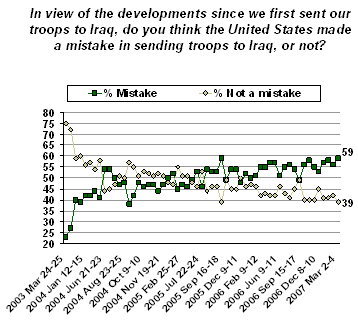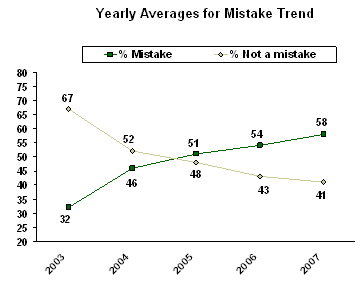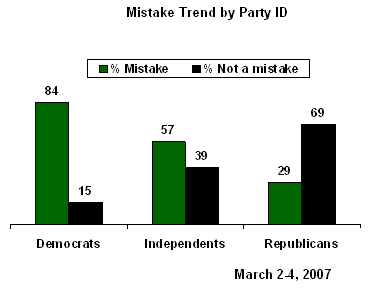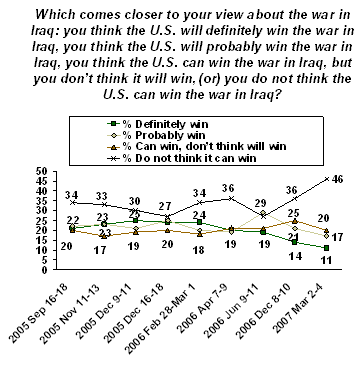GALLUP NEWS SERVICE
PRINCETON, NJ -- A record-tying number of Americans now say that the Iraq war was a mistake and less than half say the U.S. can win the war, a record low number. Almost 6 out of 10 Americans want troops to be withdrawn within 12 months.
At the same time, a majority disapproves of congressional legislation that would cut off funds for troop increases in Iraq or revoke authority granted in 2002. Instead, new USA Today/Gallup poll data suggest that Americans are in favor of congressional legislation that would set a timetable for withdrawal of all U.S. troops from Iraq by the end of next year.
Over three-quarters of Americans also support Congress both requiring U.S. troops to come home from Iraq if Iraqi leaders fail to reduce violence in that country and also requiring U.S. troops who served in Iraq to remain home for one year before being redeployed there.
"Mistake" Trend Ties at Highest Level Since War Began
The 59% of Americans who say it was a mistake to send troops is tied as the highest percentage since this question was first asked about the Iraq war in March 2003, matching the level from a September 2005 poll. In three prior polls in which this question was asked this year, the mistake percentage has been almost as high, varying between 56% and 58%.

In 2003, only 32% of Americans, on average, said it was a mistake to send troops. This average then increased to 46% in 2004, edged up to 51% in 2005, and averaged 54% last year. Now, so far this year, the average is even higher at 58%.

Bush's base of Republicans continues to support the administration position on the war; just 29% say the war was a mistake. The vast majority of Democrats, 84%, say it was a mistake to send troops to Iraq, as do 57% of independents.

Can the U.S. Win?
Just 48% of Americans say that the U.S. can win the war in Iraq, the lowest such percentage across the nine times this question has been asked since September 2005. That group of 48% is split among those who say the U.S. will definitely or probably win (28%) and those who say the U.S. can win, but won't. The 46% who say the U.S. cannot win the war is also the highest on record.

Public Opposes Congress Cutting Iraq Funding
Belief that the war was a mistake does not translate automatically into support for cutting funding for the war. This also doesn't translate into support for revoking the 2002 congressional legislation that authorized the war to begin with.
The March 2-4, 2007 poll asked Americans if they favor or oppose Congress taking six different courses of action in regards to the war in Iraq. Only 37% support Congress denying the funding needed to send any additional troops to Iraq, and only 44% say they favor Congress voting to revoke the authority it granted President Bush in 2002 to use military force in Iraq.
|
Public Support for Congress Taking Following Action in Iraq
|
||
|
Favor |
Oppose |
|
|
% |
% |
|
|
Requiring U.S. troops to come home from Iraq if Iraq's leaders fail to meet promises to reduce violence there |
77 |
20 |
|
Requiring U.S. troops returning from Iraq to stay in the U.S. for at least a year before being re-deployed to Iraq |
76 |
21 |
|
Setting a time-table for withdrawing all U.S. troops from Iraq by the end of next year |
60 |
39 |
|
Putting a cap or limit on the number of U.S. troops serving in Iraq at any one time |
54 |
42 |
|
Voting to revoke the authority it granted President Bush in 2002 to use U.S. military force in Iraq |
44 |
52 |
|
Denying the funding needed to send any additional U.S. troops to Iraq |
37 |
61 |
There is widespread support, at the three-quarters level or higher, for two actions: (1) requiring U.S. troops to come home from Iraq if the Iraq's leaders fail to meet promises to reduce violence in that country and (2) requiring troops returning from Iraq to stay in the U.S. for at least a year before being redeployed to Iraq.
A somewhat lower percentage of Americans -- but still a majority -- also support setting a time-table for withdrawing all troops from Iraq by the end of next year as well as putting a cap or limit on the number of troops serving in Iraq at any one time.
There are predictable differences in support for these types of congressional actions by party affiliation.
A majority of Democrats support all of the six measures tested, although it's a bare majority of 52% who support the idea of denying funding for additional troops. A majority of independents support four of the measures.
As would be expected, Republicans are less supportive of each measure than Democrats or independents. Still, a majority of Republicans favor the ideas of requiring troops to stay in the U.S. for at least a year before returning to Iraq, and requiring troops to come home if Iraq's leaders fail to meet promises to reduce violence there.
|
Public Support for Congress Taking Following Action in Iraq,
|
|||
|
Dems. |
Inds. |
Reps. |
|
|
% |
% |
% |
|
|
Requiring U.S. troops to come home from Iraq if Iraq's leaders fail to meet promises to reduce violence there |
89 |
78 |
59 |
|
Requiring U.S. troops returning from Iraq to stay in the U.S. for at least a year before being re-deployed to Iraq |
84 |
77 |
65 |
|
Setting a time-table for withdrawing all U.S. troops from Iraq by the end of next year |
79 |
58 |
39 |
|
Putting a cap or limit on the number of U.S. troops serving in Iraq at any one time |
71 |
51 |
34 |
|
Voting to revoke the authority it granted President Bush in 2002 to use U.S. military force in Iraq |
64 |
43 |
20 |
|
Denying the funding needed to send any additional U.S. troops to Iraq |
52 |
39 |
15 |
Bottom Line
The key question for Congress at this point: what to do about Iraq? The poll tested some of the ideas that have been advanced in recent weeks. The American public seems to have settled in on a course of action that would involve a definite commitment to withdrawing troops from Iraq, but not immediately, while rejecting some of the more drastic measures such as cutting off funds for troops or revoking the initial authority to go into Iraq.
Support for the commitment of Americans to congressional legislation mandating withdrawal is found from an update of a separate question in the latest poll that provided Americans with four different plans about what to do with the troops currently stationed in Iraq. Fifty-eight percent say the government should either withdraw the troops immediately (20%) or within the next 12 months (38%). Twenty-six percent of Americans say the government should work to withdraw troops but should take as long as is necessary to do so, and 13% support sending more troops to Iraq.
Survey Methods
Results are based on telephone interviews with 1,010 national adults, aged 18 and older, conducted March 2-4, 2007. For results based on the total sample of national adults, one can say with 95% confidence that the maximum margin of sampling error is ±3 percentage points. In addition to sampling error, question wording and practical difficulties in conducting surveys can introduce error or bias into the findings of public opinion polls.